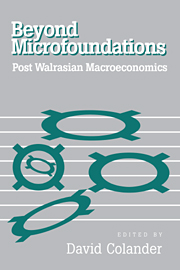Book contents
- Frontmatter
- Contents
- About the authors
- Preface
- 1 Overview
- I The Post Walrasian macroeconomic vision
- 2 Taking markets seriously: groundwork for a Post Walrasian macroeconomics
- 3 Towards a not-too-rational macroeconomics
- 4 The macrofoundations of micro
- II The underpinnings of Post Walrasian macroeconomics
- III Modeling a Post Walrasian economy
- IV New structuralist macroeconomics vs. Post Walrasian macroeconomics
- IV Appendix: Literature Survey
- Name Index
- Subject Index
2 - Taking markets seriously: groundwork for a Post Walrasian macroeconomics
Published online by Cambridge University Press: 05 June 2012
- Frontmatter
- Contents
- About the authors
- Preface
- 1 Overview
- I The Post Walrasian macroeconomic vision
- 2 Taking markets seriously: groundwork for a Post Walrasian macroeconomics
- 3 Towards a not-too-rational macroeconomics
- 4 The macrofoundations of micro
- II The underpinnings of Post Walrasian macroeconomics
- III Modeling a Post Walrasian economy
- IV New structuralist macroeconomics vs. Post Walrasian macroeconomics
- IV Appendix: Literature Survey
- Name Index
- Subject Index
Summary
In the modern textbook, the analysis deals with the determination of market prices, but the discussion of the market itself has entirely disappeared. This is less strange than it seems. Markets are institutions that exist to facilitate exchange; that is, they exist in order to reduce the cost of carrying out exchange transactions. In an economic theory which assumes that transaction costs are nonexistent, markets have no function to perform, and it seems perfectly reasonable to develop the theory of exchange by an elaborate analysis of individuals exchanging nuts for apples on the edge of the forest or some similar fanciful example.
Ronald Coase (1988:7-8)Marshall's definition of economics as “a study of mankind in the ordinary business of life” is hopelessly ambiguous; but it effectively highlights one central difference between economics and physical sciences: The subject matter of economics is the stuff of everyday experience. Unfortunately, familiarity sometimes encourages us to treat familiar facts as self-evident truths rather than habits of mind and so unconsciously to inject these “truths” into formal theoretical arguments where they do not belong. Outwardly valid theoretical findings that emulate superficial technical aspects of exact sciences then become problematic because they derive not from explicit assumptions but rather from a confusion of habits of thought with rational analysis (cf. Born, 1962: 226). Because the confusion thus introduced is a matter of conceptual dissonance rather than logical inconsistency, the vacuousness of much supposedly “settled” theory is thus masked.
- Type
- Chapter
- Information
- Beyond MicrofoundationsPost Walrasian Economics, pp. 21 - 38Publisher: Cambridge University PressPrint publication year: 1996
- 7
- Cited by

